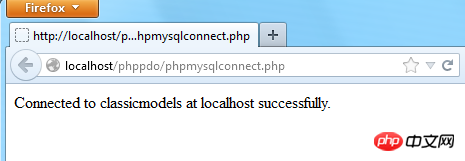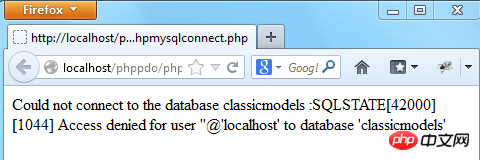PHP MySQL: Connect to MySQL database
In this tutorial, we will show you how to connect to a MySQL database server using PDO objects.
Related video tutorial recommendations: mysql tutorial
Before connecting to the MySQL database, you must specify the following information:
MySQL Data source name or DSN: Specify the address of the MySQL database server. You can use an IP address or server name, for example, 127.0.0.1 or localhost
MySQL database name: Indicates the name of the database to connect to.
Username and Password: Specify the username and password of the MySQL user used to connect to the MySQL database server. This account must have sufficient permissions to access the database specified above.
We will use:
Local MySQL database server, so that the DSN is localhost.
In classicmodels as a sample database.
Root account with blank password, just for demonstration.
Steps to connect to MySQL
First, For convenience, we will create a new PHP file for the database configuration, dbconfig.php Contains all configured parameters:
<?php
$host = 'localhost';
$dbname = 'classicmodels';
$username = 'root';
$password = '';Secondly, we create a new PHP file called phpmysqlconnect.php:
<?php
require_once 'dbconfig.php';
try {
$conn = new PDO("mysql:host=$host;dbname=$dbname", $username, $password);
echo "Connected to $dbname at $host successfully.";
} catch (PDOException $pe) {
die("Could not connect to the database $dbname :" . $pe->getMessage());
}How the script works
dbconfig.php uses the require_once function to include the file in the script.
In the try block, we create a new PDO object with three parameters: connection string, username and password. The connection string consists of the $host and $dbname variables in the file dbconfig.php.
If the connection to the MySQL database is successfully established, we will display a success message. If there are any errors or exceptions, PHP will issue a PDOException containing a detailed error message. We call the object's getMesage() method PDOException to get the detailed message to be displayed.
Then we test the script from a web browser.

It works as expected. We have successfully connected to the MySQL server.
Let's try changing something in the code to make the script display an error message.
If you set the $username variable to empty, you will receive the following error message:

The error message displays:
Access denied for user ''@'localhost' to database 'classicmodels'
Because we don't have any blank users in the classicmodels database.
When the script ends, PHP will automatically close the connection to the MySQL database server. If you want to explicitly close the database connection, you need to set the PDO object to null as follows:
$conn = null;
In this tutorial, you have learned how to use the PHP PDO object to connect to MySQL and handle what may happen when connecting to the MySQL database any exception.
The above is the detailed content of PHP MySQL: Connect to MySQL database. For more information, please follow other related articles on the PHP Chinese website!

Hot AI Tools

Undresser.AI Undress
AI-powered app for creating realistic nude photos

AI Clothes Remover
Online AI tool for removing clothes from photos.

Undress AI Tool
Undress images for free

Clothoff.io
AI clothes remover

AI Hentai Generator
Generate AI Hentai for free.

Hot Article

Hot Tools

Notepad++7.3.1
Easy-to-use and free code editor

SublimeText3 Chinese version
Chinese version, very easy to use

Zend Studio 13.0.1
Powerful PHP integrated development environment

Dreamweaver CS6
Visual web development tools

SublimeText3 Mac version
God-level code editing software (SublimeText3)

Hot Topics
 Working with Flash Session Data in Laravel
Mar 12, 2025 pm 05:08 PM
Working with Flash Session Data in Laravel
Mar 12, 2025 pm 05:08 PM
Laravel simplifies handling temporary session data using its intuitive flash methods. This is perfect for displaying brief messages, alerts, or notifications within your application. Data persists only for the subsequent request by default: $request-
 cURL in PHP: How to Use the PHP cURL Extension in REST APIs
Mar 14, 2025 am 11:42 AM
cURL in PHP: How to Use the PHP cURL Extension in REST APIs
Mar 14, 2025 am 11:42 AM
The PHP Client URL (cURL) extension is a powerful tool for developers, enabling seamless interaction with remote servers and REST APIs. By leveraging libcurl, a well-respected multi-protocol file transfer library, PHP cURL facilitates efficient execution of various network protocols, including HTTP, HTTPS, and FTP. This extension offers granular control over HTTP requests, supports multiple concurrent operations, and provides built-in security features.
 Simplified HTTP Response Mocking in Laravel Tests
Mar 12, 2025 pm 05:09 PM
Simplified HTTP Response Mocking in Laravel Tests
Mar 12, 2025 pm 05:09 PM
Laravel provides concise HTTP response simulation syntax, simplifying HTTP interaction testing. This approach significantly reduces code redundancy while making your test simulation more intuitive. The basic implementation provides a variety of response type shortcuts: use Illuminate\Support\Facades\Http; Http::fake([ 'google.com' => 'Hello World', 'github.com' => ['foo' => 'bar'], 'forge.laravel.com' =>
 12 Best PHP Chat Scripts on CodeCanyon
Mar 13, 2025 pm 12:08 PM
12 Best PHP Chat Scripts on CodeCanyon
Mar 13, 2025 pm 12:08 PM
Do you want to provide real-time, instant solutions to your customers' most pressing problems? Live chat lets you have real-time conversations with customers and resolve their problems instantly. It allows you to provide faster service to your custom
 Discover File Downloads in Laravel with Storage::download
Mar 06, 2025 am 02:22 AM
Discover File Downloads in Laravel with Storage::download
Mar 06, 2025 am 02:22 AM
The Storage::download method of the Laravel framework provides a concise API for safely handling file downloads while managing abstractions of file storage. Here is an example of using Storage::download() in the example controller:
 PHP Logging: Best Practices for PHP Log Analysis
Mar 10, 2025 pm 02:32 PM
PHP Logging: Best Practices for PHP Log Analysis
Mar 10, 2025 pm 02:32 PM
PHP logging is essential for monitoring and debugging web applications, as well as capturing critical events, errors, and runtime behavior. It provides valuable insights into system performance, helps identify issues, and supports faster troubleshoot
 Explain the concept of late static binding in PHP.
Mar 21, 2025 pm 01:33 PM
Explain the concept of late static binding in PHP.
Mar 21, 2025 pm 01:33 PM
Article discusses late static binding (LSB) in PHP, introduced in PHP 5.3, allowing runtime resolution of static method calls for more flexible inheritance.Main issue: LSB vs. traditional polymorphism; LSB's practical applications and potential perfo
 How to Register and Use Laravel Service Providers
Mar 07, 2025 am 01:18 AM
How to Register and Use Laravel Service Providers
Mar 07, 2025 am 01:18 AM
Laravel's service container and service providers are fundamental to its architecture. This article explores service containers, details service provider creation, registration, and demonstrates practical usage with examples. We'll begin with an ove






